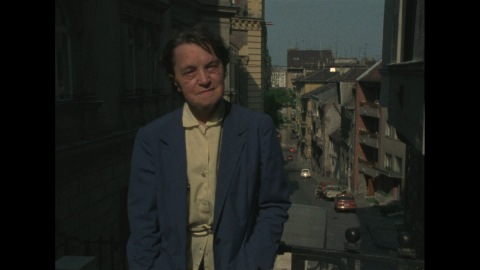Sára Karig, 28. 6. 1987, Budapest, Hungary
Metadata
| Location | Budapest, Hungary |
| Date | 28. 6. 1987 |
| Length | 02:30 |
Watch and Listen
| Full video (mp4, 2 min) |
| Preview video (mp4, 1 min) |
| Audio track (mp3, 2 min)
|
TranscriptPlease note that this transcript is based on audio tracks and doesn't have to match exactly the video
Can you tell us your story?
Karig Sára: I was living in this house, in this street and that time in 1947, I was in an official of the elections of this district. And after the election on the second day, when I came out of the house, I was accosted by two people actually on the electional day, I didn’t think it was wrong of me to do it. But actually gave instructions to arrest about 600 people, because they were, well committing a fraud with the electional ballots you know, and it's very complicated to tell it, what it was. I never thought it would have consequences. Well, the two people, when I asked what they wanted, they said they would like to have me as a witness for economic questions to be settled, and I said, well, I haven't got any notice. And they said that they can write out one for me. And so they did, and by the time they did I looked up and there were two of them coming again down there. So, when I turned around I saw two of them coming from up, from there, so I said is this, this kind of an entourage you always give to a witness? And they said well you know how it is, and they well at the time they looked a little bit cynical and suspicious to me, but when I went down to the car and it was a black car, I could see it from the next flight already, with curtains on it, and the black big cars with curtains that meant always that somebody was taken away for some reason or other. And so when I opened the car there were only two more, altogether six of them, and the two already had the “davaiguitars”, you know. That's what we called machine guns. So I went with them, they have given me over to the Soviet authorities.
And I went to the Arctic region where I spent about seven years and came out only because Stalin died, happily, and so I got free and I live ever since very happily.
Sára Karig (1914–1999)

Sára Karig was born in Baja on 13 June 1914 and died in Budapest on 2 February 1999. Her parents were teachers raising three children. Her mother laid great emphasis on her children’s progressive education. Sára Karig attended schools in Baja, Germany, then graduated from universities in Szeged and Budapest, and obtained a degree in teaching at the University of London.
In 1943, she became a member of the Social Democratic Party (SDP). From 1944, she worked at the Children’s Department of the Swedish Red Cross. She saved the lives of many children of Jewish descent, Hungarian deserters and English prisoners of war, and in 1985, she received the Righteous Among the Nations Award for her humanitarian activities.
In the elections of 1947 in Hungary, as a district election officer delegated by the SDP, she made a report on the so-called ‘blue-ballot’ election fraud. Despite the political scandal that was breaking out, she was taken in for witness hearing by the police the next day, and was soon handed over to investigators of the Soviet Army. The Soviets deported her from Budapest to the Arctic region without any charges or convictions, and she spend the next six years in the forced labour camp of Vorkuta, working in clay and coal mines.
After Stalin’s death in 1953, most of the foreign political prisoners were released, this was when she arrived home in an extremely poor physical condition. With the help of her friends, she started working as a translator at Új Magyar Könyvkiadó (New Hungarian Publishing House), later known as Europa Könvykiadó (Europa Publishing House), where she became an editor a few years later. Her translations included works by Bulgakov, Tagore, Agatha Christie, and she carried significant editing work, for example the 84-volume series Népek meséi (Tales of Peoples). She was rehabilitated in 1957. In 1985, she received the Attila József Prize, and in 1994, she was awarded the Small Cross of the Order of Merit of the Hungarian Republic for her work as a translator.
